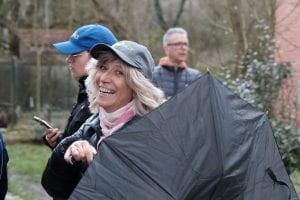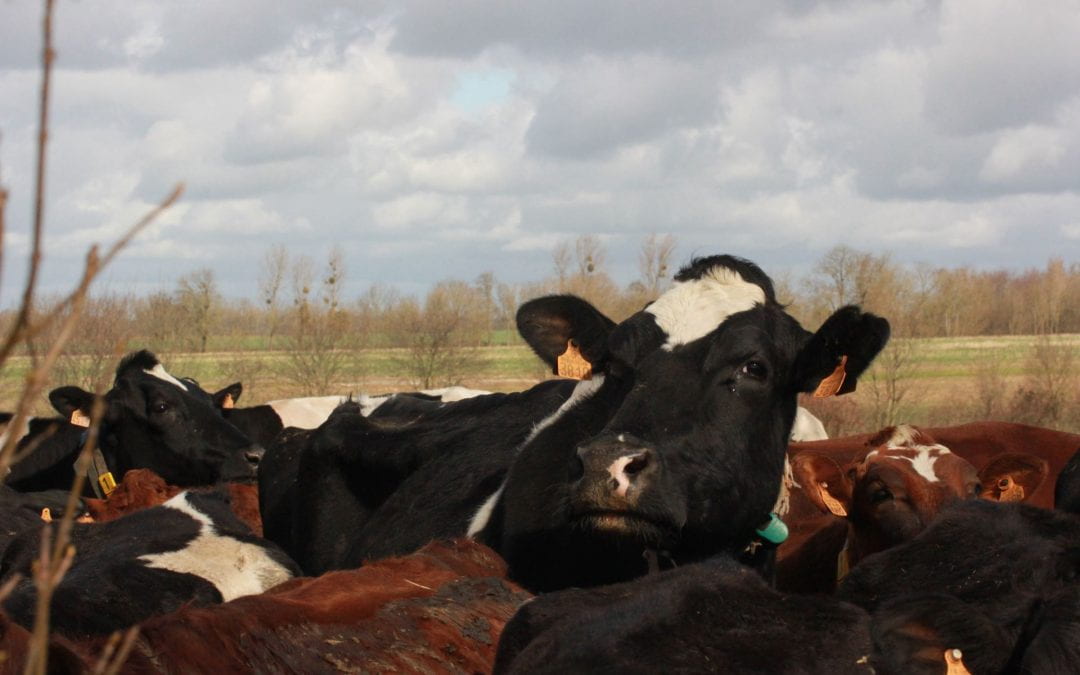Shaking off the inevitable jet lag, the PaceDocs crew woke up ready to begin their first official day of filming.
The first location was nearly an hour away and nestled into the rolling fields of the Laon countryside. Ferme de la Orion welcomed the team and allowed us to wander around their beautiful grounds to capture footage before we dove into the interview process. Once the crew was settled and set up, we were led down a flight of stairs into a dark cavern; on either side of the walkway, the walls were surrounded by racks of cheese.
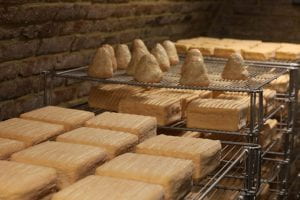
In the depths of a brick-covered cave, a staff member spoke to the crew about their cheese and its aging process. The chilly and damp atmosphere nurtures the cheese during this period. The coloration ranges from off-white to light orange based on the number of days it had been sitting, which can be between 30 to 60 days. The orange crust around the select cheeses is courtesy of the neighboring bricks.

During one of the staff member’s interviews, the team learned about the history and significance of the Laon farmlands. France operates under one climate, meaning its citizens must adapt to working within the seasons. Unlike the United States, France does not have regions like California and is unable to produce fruits throughout the entire year. The people of France experience the seasons together, regardless of their location throughout the country.
Supermarkets, while they do exist, are scarce in France. A majority of product transactions occur in markets or directly from the producer, where consumers know that their purchases are fresh and the experience is more personal. Sharing the experience of food is an extremely integral component of French culture. Meals are primarily eaten at a dinner table and are a moment spent with family and friends.
The PaceDocs crew had the privilege of experiencing this special moment of sharing a meal at their next stop: Jardins d’Helene. Helene, a former nurse, dedicated her career to helping those who wish to stray away from eating processed foods. In her kitchen, Helene cooks food that improves gut health and improves your immune system. The team was welcomed into her home and shared a homemade meal by Helene herself.
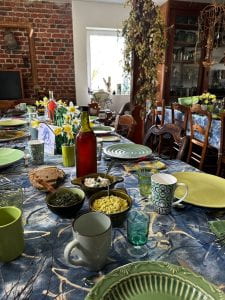
The ingredients utilized in Helene’s incredible cooking can be located around her home garden and nearby nature trail. The wooded trail was covered with wild garlic (also known as bear garlic) which can be used as a detox method that contains vitamins, nettles, and Gallet (a small plant that helps the kidneys).
Helene’s inspiration that led her down the path of helping others was her own family. Seventeen years ago, when her children were young, they suffered from poor immune systems and respiratory issues. The prime suspect for the cause of their health was the food they consumed, which was full of chemicals and other unknown ingredients. Fifteen years later, Helene’s business has blossomed and she has helped so many other families find a new healthy and happy lifestyle that thrives off of sustainability and farm-to-table living.

Walking off their delicious lunch, the team made their way to the last stop: La Chevrerie de Bruyeres. This quaint goat farm houses 58 goats and produces savory goat cheese and milk. A goat’s milk is the lightest of the animal diary demographic. Not only is it beneficial for those who choose to drink it, but the milk is infused in specialty soaps designed to cure acne, eczema, and rashes.
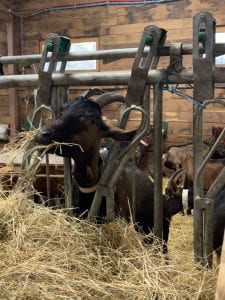
The best part about La Chevrerie de Bruyeres? The establishment is one of the only non-kill goat farms! If any of the goats are unable to be sold, they are transferred to be used by a commercial assistant where the animals will spend their days maintaining lawns. This is a win-win, the goats live long happy lives while also helping the environment.
A quote from one of the staff members at Ferme de la Orion stuck out in the team’s minds all day.
During her interview, the woman said, “The food is our heritage”.
As we visited the three different locations, the crew recognized the importance of the food and the way it brings together families. The regions of France rely on farm-to-table, not only to help the environment but preserve the land’s natural history.
Continue to check out the blog for new posts daily! Follow us @PaceDocs on Facebook, Instagram, and Twitter.
